This series aims to shine a spotlight on different CBR alumni and their career journeys after the CBR. We were so pleased to share the story of Eva Yap.
Are you a CBR alum who wants to share your experiences, connect with the CBR, or have your profile featured? Email the CBR’s Education Program Manager, Dr. Parvin Bolourani (parvin@mail.ubc.ca).
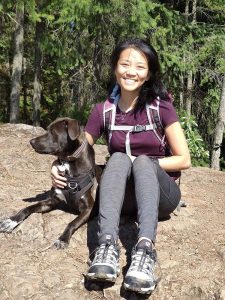
Eva Yap
When you were younger, did you ever attend a life-changing science camp? Or a STEM program that sparked your curiosity? Eva Yap, a CBR alum, is doing exactly that: creating programs and opportunities for youth to get excited about science.
As an Outreach Programs Coordinator in SFU’s Faculty of Applied Sciences, Eva oversees a variety of science programs aimed at youth from K – 12. We sat down with Eva and asked her about her career path – from her MSc in the Karsan Lab, to her post-grad job search, to developing outreach programs for kids today.
What did you study in grad school?
I did my MSc in Experimental Medicine from 2014 – 2017, on a computational biology project in the Karsan Lab. My graduate research was focused on cancer and genetics. I aimed to figure out if a genetic variant in a formalin-fixed paraffin-embedded (FFPE) tumour is hereditary (meaning that the variants are found in normal cells) or tumour-specific (meaning that the variants are found in tumour cells only).
Hereditary genetic variants have clinical impacts on cancer patients and their families, and tumours contain both hereditary and tumour-specific variants. If we are able to differentiate between hereditary and tumour-specific variants in tumour DNA, we can save on cost and time because we only need to analyze the patient’s tumour DNA to acquire information on both variant types.
With this information, we can then follow up with patients who have hereditary variants that warrant medical attention by collecting and analyzing blood or saliva samples.
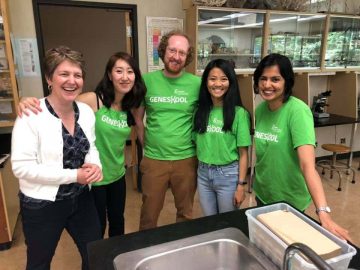
Eva Yap (second from right) with some fellow Geneskool team members
That’s really interesting! Tell us about your career path afterwards. How did you get your current position?
After graduating, I worked at Genome BC Geneskool, delivering genomics and genetics outreach programs. It was super aligned with my grad school (and even undergrad) studies!
I’ve always enjoyed being an educator, so I also completed a Master’s of Education at SFU, with a focus on educational technology and learning design. While I was there, I saw and applied for new job opportunity in the Outreach Department of SFU’s Faculty of Applied Sciences, which is where I am now!
What are some of the programs you manage?
I was hired to run SFU Science AL!VE, an outreach program in the Faculty of Applied Sciences that focuses on K-7 programs. As part of the Faculty’s efforts to engage high school students, my portfolio now focuses on creating and overseeing more programs for youth in high school. Just a few of these include:
- App Dev Workshop: A program where kids develop mobile apps; some are co-ed, others are all-girls.
- Pepper Academy: Students program this semi-humanoid, fridge-sized robot called Pepper, which can identify emotions.
- Invent the Future: A summer enrichment program focused on artificial intelligence for trans and cisgender women, non-binary and two-spirit students from Grade 9-12.
- STEM Speaker Series: Graduate and undergraduate students present their projects to high school students.
- Applied Sciences After Dark: Members of the public can learn how to code. I started this series because I realized that a lot of parents want to support their kids’ coding interests but don’t know how, so this provides them with basic coding skills.
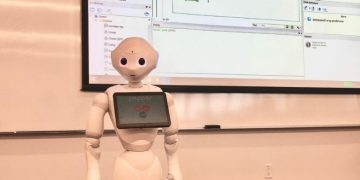
Pepper the robot. Image credit: SFU Applied Sciences.
What’s the biggest challenge in your work?
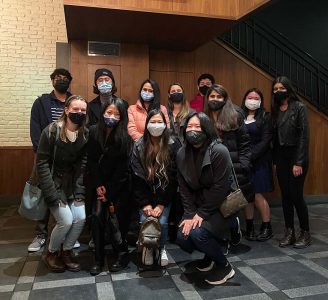
Eva (bottom row, second from left) with the SFU Outreach Team
The biggest challenge was definitely when COVID hit, and I had to convert all our activities to a virtual format. I was hired to run in-person programs, and I didn’t have any experience with Zoom events or programs. It was a steep learning curve, but I think my educational technology education helped a lot.
Another challenge is managing everything I have to do. I develop curricula and promote our programs, but also perform operational work like budgeting, buying materials, setting up registration, following up with parents, and hiring and training my staff. Last summer, I was overseeing 17 staff, so I have to make sure that they are trained, supported, and feel like they’re developing in a way that’s meaningful to them. It’s very challenging to manage all that, but on the flipside, I enjoy doing a variety of things.
What do you like the most?
My favourite part of the job is seeing youth excited about STEM and wanting to learn more, and helping my staff succeed in their roles. That’s the most rewarding thing!
When did you realize you wanted to do outreach, rather than labwork?
I don’t think there was really a single, defining point where I felt like I didn’t want to work in a lab. I liked science outreach but I also liked computational biology, so I applied for jobs in both areas, and took the Geneskool opportunity when it was offered to me. Things just kind of fell into place!
When you were a student, what did you value the most about your time at the CBR?
The CBR Graduate Award Program (GAP) was a lot of fun. We explored different scientific topics through the Program’s journal club, including ones I might not have been exposed to in my lab. Since I was located off-campus at the Genome Sciences Centre, GAP made me drag myself to UBC and talk to people there!
As part of GAP, my cohort put together an “When Arts Meets Science” event, with a “paint your thesis” activity and a keynote talk about science communication. I feel like that actually helped me get my current position, because I was getting a lot of relevant experience by organizing event logistics and inviting speakers, which I still do now.
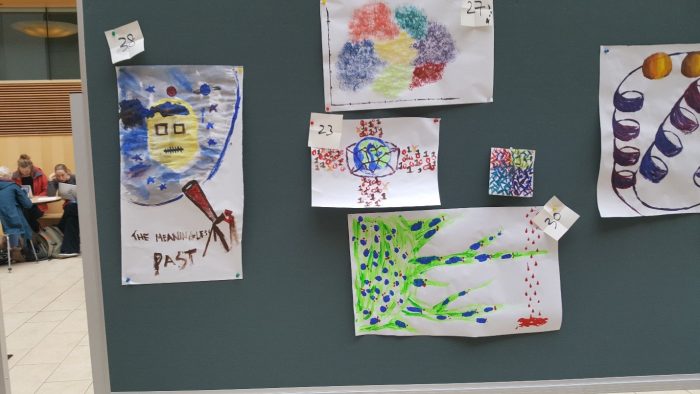
Artwork from the “When Arts Meets Science” event run by Eva and her GAP cohort
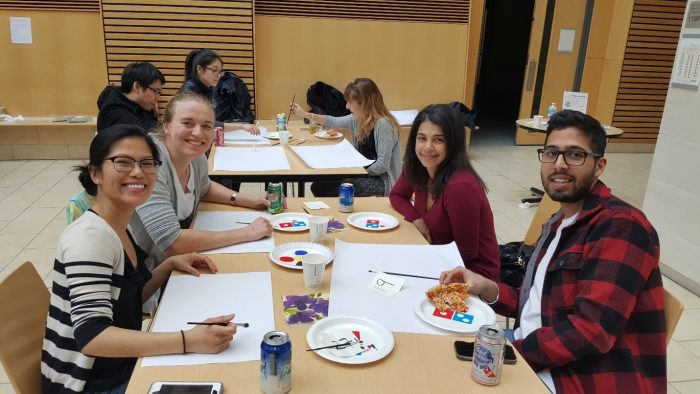
Attendees participating in the “Paint Your Thesis” activity
What was most memorable about your time in the Karsan Lab?
My fellow lab mates! Some of them are really amazing people who provided lots of advice on my grad school project. We still keep in touch and support each other, and sometimes I’ll even ask for feedback on outreach activities I’m planning.
If you could go back in time and give your grad school self any advice, what would you say?
In grad school, I think there’s a lot of pressure to achieve as much as possible, as quickly as possible, and also to try and fit a certain mould. Like you have to do a PhD, then more science, then more research – that’s portrayed as the favoured career path.
Looking back, I would have told myself to take my time, and that life is not a race. Everybody’s path is different, so don’t worry too much and try not to compare yourself to other people. Your journey is your own.
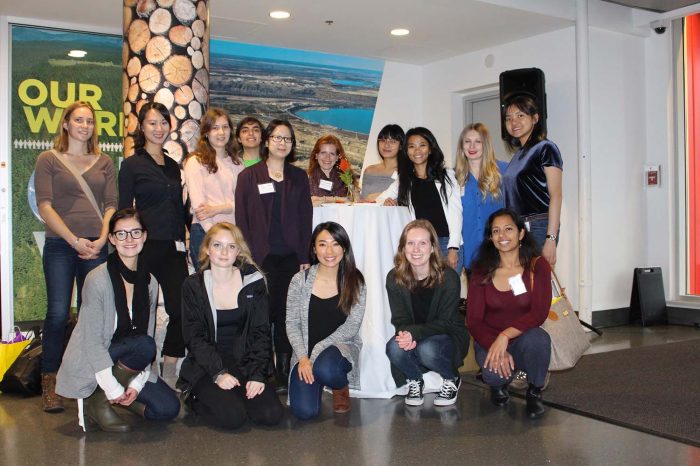
Eva (top row, third from right) at a Science World Girls and STEAM event with the CBR Outreach Committee
How did you get involved with outreach programs?
UBC has some organizations like Let’s Talk Science and the CBR Outreach Committee. I actually volunteered with Geneskool before I got hired there, and I feel like my previous experience helped, as I was familiar with the program already.
There’re so many opportunities out there, so sign up for newsletters, talk to people, and volunteer. You never know who you’ll meet – one conversation could lead to your next job!
In your role, you do a lot of science communication, especially for K – 12 youth. Why is this important for scientists? Do you have any advice for trainees?
You know your own research best. But in science communication, you have to make that research understandable to an audience, and hold their attention for maybe 20 minutes. It’s not as easy as it seems!
At the end of the day, the people who are impacted by your science are members of the public. They have different experiences and needs than an academic audience. It’s really important to understand that, and to be able to explain your project comprehensively to them in a short amount of time.
I’d challenge trainees to participate in outreach programs and explain their science to high school students. Kids are very honest with their thoughts – if they’re confused, they will tell you, so it’s good practice for answering questions, too.
What are your tips for approaching a job search process?
My key piece of advice is to tailor your resume and cover letter to each job you apply to. Now that I’m responsible for hiring people, I’d say it’s very easy to tell if someone’s tailored their application to your job posting and organization.
So do your research! What are the organization’s values? What is their mission and vision? Write your cover letter with that in mind, and tailor your resume to show that you have the skills to do what they need you to do in the job description.
What advice do you have for students who are transitioning to a workplace outside of academia?
- Find a mentor. Talk to them about their experiences, go to career events, and meet other people. In school, people often see degree completion as the endpoint, but it’s always good to think ahead.
- Don’t give up! Not everyone has a straightforward career route. You might apply for a few jobs and not get them, so you have to apply for more until you get an offer… and all the while, life is happening! While it may sound cheesy, I would say: don’t give up, even when things don’t go your way. Just keep pushing forward.


